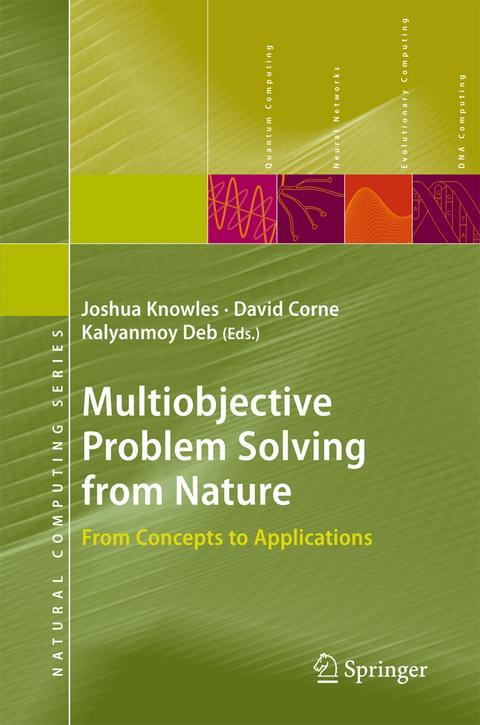
Multiobjective Problem Solving from Nature
Springer Berlin (Verlag)
978-3-662-50119-1 (ISBN)
Multiobjective problems involve several competing measures of solution quality, and multiobjective evolutionary algorithms (MOEAs) and multiobjective problem solving have become important topics of research in the evolutionary computation community over the past 10 years. This is an advanced text aimed at researchers and practitioners in the area of search and optimization.
The book focuses on how MOEAs and related techniques can be used to solve problems, particularly in the disciplines of science and engineering. Contributions by leading researchers show how the concepts of multiobjective optimization can be used to reformulate and resolve problems in broad areas such as constrained optimization, coevolution, classification, inverse modelling and design. The book is distinguished from other texts on MOEAs in that it is not primarily about the algorithms, nor specific applications, but about the concepts and processes involved in solving problems using a multiobjective approach. Each chapter contributes to the central, deep concepts and themes of the book: evaluating the utility of the multiobjective approach; discussing alternative problem formulations; showing how problem formulation affects the search process; and examining solution selection and decision making.
The book will be of benefit to researchers, practitioners and graduate students engaged with optimization-based problem solving. For multiobjective optimization experts, the book is an up-to-date account of emerging and advanced topics; for others, the book indicates how the multiobjective approach can lead to fresh insights.
Introduction: Problem Solving, EC and EMO.- Introduction: Problem Solving, EC and EMO.- Exploiting Multiple Objectives: From Problems to Solutions.- Multiobjective Optimization and Coevolution.- Constrained Optimization via Multiobjective Evolutionary Algorithms.- Tackling Dynamic Problems with Multiobjective Evolutionary Algorithms.- Computational Studies of Peptide and Protein Structure Prediction Problems via Multiobjective Evolutionary Algorithms.- Can Single-Objective Optimization Profit from Multiobjective Optimization?.- Modes of Problem Solving with Multiple Objectives: Implications for Interpreting the Pareto Set and for Decision Making.- Machine Learning with Multiple Objectives.- Multiobjective Supervised Learning.- Reducing Bloat in GP with Multiple Objectives.- Multiobjective GP for Human-Understandable Models: A Practical Application.- Multiobjective Classification Rule Mining.- Multiple Objectives in Design and Engineering.- Innovization: Discovery of Innovative Design Principles Through Multiobjective Evolutionary Optimization.- User-Centric Evolutionary Computing: Melding Human and Machine Capability to Satisfy Multiple Criteria.- Multi-competence Cybernetics: The Study of Multiobjective Artificial Systems and Multi-fitness Natural Systems.- Scaling up Multiobjective Optimization.- Fitness Assignment Methods for Many-Objective Problems.- Modeling Regularity to Improve Scalability of Model-Based Multiobjective Optimization Algorithms.- Objective Set Compression.- On Handling a Large Number of Objectives A Posteriori and During Optimization.
| Erscheinungsdatum | 16.07.2016 |
|---|---|
| Reihe/Serie | Natural Computing Series |
| Zusatzinfo | XVI, 411 p. |
| Verlagsort | Berlin |
| Sprache | englisch |
| Maße | 155 x 235 mm |
| Gewicht | 652 g |
| Themenwelt | Kunst / Musik / Theater ► Design / Innenarchitektur / Mode |
| Informatik ► Theorie / Studium ► Künstliche Intelligenz / Robotik | |
| Mathematik / Informatik ► Mathematik ► Algebra | |
| Technik | |
| Schlagworte | algorithms • classification • Decision Making • Design • Engineering design • Evolution • evolutionary algorithm • learning • machine learning • Modeling • Multi-Objective Optimization • Natural Computing • Optimization • Problem Solving • Problem-Solving |
| ISBN-10 | 3-662-50119-8 / 3662501198 |
| ISBN-13 | 978-3-662-50119-1 / 9783662501191 |
| Zustand | Neuware |
| Informationen gemäß Produktsicherheitsverordnung (GPSR) | |
| Haben Sie eine Frage zum Produkt? |
aus dem Bereich


